An Interview with Pastor Scott Williquette
A Conference Ministry to Pastors
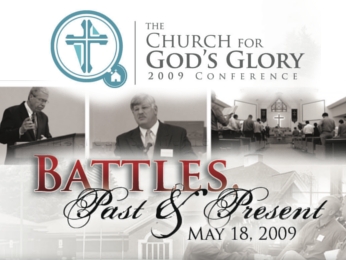 I first heard about the Conference on the Church for God’s Glory in 2005 and decided to attend. I found the experience of this small but high-quality, one-day conference to have an extraordinary cost-benefit ratio. After attending again in 2008, I felt keenly that too few people knew about this small gem of an event, and I wanted to know a little more about the thinking that goes into it. What follows is a brief interview with Pastor Scott Williquette who organizes the event and pastors the host church, First Baptist Church in Rockford, Illinois.
I first heard about the Conference on the Church for God’s Glory in 2005 and decided to attend. I found the experience of this small but high-quality, one-day conference to have an extraordinary cost-benefit ratio. After attending again in 2008, I felt keenly that too few people knew about this small gem of an event, and I wanted to know a little more about the thinking that goes into it. What follows is a brief interview with Pastor Scott Williquette who organizes the event and pastors the host church, First Baptist Church in Rockford, Illinois.
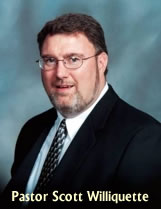 Question: Tell us a bit about how the Conference on the Church for God’s Glory began and what moved you in that direction.
Question: Tell us a bit about how the Conference on the Church for God’s Glory began and what moved you in that direction.
Answer: Over the years I have pastored First Baptist, I became acquainted with a number of pastors in Illinois and Wisconsin who for various reasons couldn’t take advantage of opportunities for continuing education or even helpful conferences. Some of them work secular jobs full or part time, and many just didn’t have the time and money to attend multi-day conferences. The Lord has placed us at a perfect geographical spot to help meet that need. Rockford is twenty minutes from the Wisconsin border, so men in Wisconsin and Illinois can drive to First Baptist, enjoy a great day of instruction and encouragement, drive home that evening, and not miss much ministry. We designed the day in such a way as to maximize every moment. The day begins at 11 a.m. and ends at around 8:30 p.m. We provide a mixture of preaching sessions and workshops, and provide lunch and dinner on site. It is a very full, exhausting, and valuable day.
Q: I’ve noticed that lots of people from your church get involved in the conference program, from greeting participants to running the bookstore to serving food. Was your church always so supportive of the idea of hosting a conference, or did you have to work at “selling” the idea for a while?
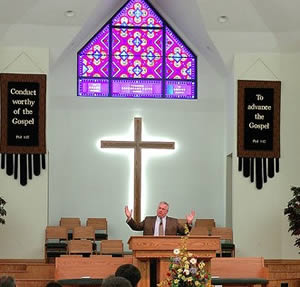 A: From the very beginning our people have really “owned” this conference. Typically about half of our congregation is involved either before the conference or on the day of, and no it has never taken much selling. I stress to our people that by ministering to pastors we are also ministering to churches. Our people are very excited about doing both. The conference is a great opportunity for our church to focus outside of itself.
A: From the very beginning our people have really “owned” this conference. Typically about half of our congregation is involved either before the conference or on the day of, and no it has never taken much selling. I stress to our people that by ministering to pastors we are also ministering to churches. Our people are very excited about doing both. The conference is a great opportunity for our church to focus outside of itself.
Q: Well, I think it says a lot about the congregation there that they were so warm to the idea from the beginning. Do you have any advice for pastors who might want to offer something similar as a ministry of their own churches?
A: I think it would be a great thing if more churches provided these kinds of “oasis” conferences for pastors. The more we can sharpen one another and bear one another’s burdens, the better. I guess my advice would be, determine if there is a need and whether or not your church can meet it. Then begin small by gathering pastors within a radius of an hour or so for a two- to four-hour pastor’s forum. Bring in a speaker to teach two to three workshops and field questions, and serve a light meal or refreshments. I had Dr. Rolland McCune in for two weekend conferences and then hosted a pastor’s forum the following Mondays. One forum dealt with refining our Old Testament interpretive skills, the other with the doctrine of sanctification. Both were very beneficial days, about twenty men attending. Our people served where needed and I think enjoyed their part in encouraging the Lord’s servants.
Q: With all the available conferences out there every year, what would you say is different about this one?
A: Two things. First, we really understand the time constraints on pastors, so we try not to waste a moment of the day. Our conference is designed to condense two conference days into one. For instance this year’s one-day conference includes seven plenary sessions and two meals. Second, we try to be a blessing to pastors (and other Christian leaders) even after they leave. Our workshop leaders provide full notes, which men can use as teaching aids in their ministries; and then there’s the book room. The goal of the book room is to allow men to peruse the best titles from Christian publishers and allow them to purchase them at discounted prices by means of a conference discount. This year seventeen Christian publishers are involved. Each will display some of their best titles, and most are providing a free gift book to each conference registrant. Last year some men skipped meals to enjoy the book room. I can guarantee that every conference registrant will drive home with a large bag of excellent ministry resources.
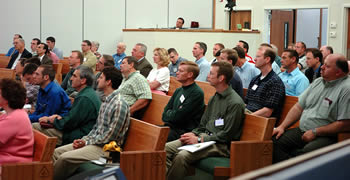 Q: The topic this year (“Battles Past and Present”) links the past to the present and future and includes biographical sketches as well as preaching and workshops. What do you hope this approach will accomplish, and what are some of reasons for using these particular historical figures?
Q: The topic this year (“Battles Past and Present”) links the past to the present and future and includes biographical sketches as well as preaching and workshops. What do you hope this approach will accomplish, and what are some of reasons for using these particular historical figures?
A: The preaching sessions are designed to allow pastors and leaders to sit back and be encouraged from the Word. Some pastors are struggling in their ministries. Some are overwhelmed. Some are contemplating resigning. My hope is that by means of clear Bible exposition, they will be refreshed, challenged, and—when need be—convicted. Two workshops this year are designed to remind us of the battles that our forefathers fought so that we can learn from them. As I have read recently of Spurgeon’s battle in the Baptist Union, for instance, it became obvious to me that the points of battle rarely change. One workshop will focus on battles we are facing today. I won’t reveal the content of Jeff Straub’s workshop, but I can assure you that he is not going to pull any punches. The two biographical sketches are designed to expose us to two men who fought for orthodoxy. We may not agree with every aspect of their theology, but there is much we can learn from their passion for truth.
Q: What do you see as some pressing needs among fundamentalists today, and do you think the conference might aim to address some of these needs in the future?
A: The greatest need in Fundamentalism (and in broader Evangelicalism) is the need to let the biblical text say what it says. The weaknesses of both movements lies in the fact that God and His Word are not supreme in His church. The Conference on the Church for God’s Glory has attempted to address the church’s weaknesses in the past and will continue to do so in the future. This year’s conference will be no exception. While in the midst of the Down-Grade Controversy, Spurgeon said, “I learned, when I was a boy, that the chief end of man was to glorify God and enjoy Him forever; but I hear now, according to the new theology, that the chief end of God is to glorify man and enjoy him forever. Yet this is the turning of things upside down.” This new theology fills the church today, and we are attempting to help men pursue the real chief end of man.
Q: It is remarkable how well Spurgeon’s observation fits our own day. Do you think that, in some ways, the reason we’re still struggling with the same problems today is that Christians in general do not pay enough attention to history? Or is it more just a matter of how sinners are wired? (Come to think of it, what Spurgeon called “new theology” pretty well describes the events in Eden).
A: I think the church struggles to remain orthodox for a number of reasons. Yes, I think that we do not teach our people church history, and it is to our detriment. One of our conference speakers this year is Dave Saxon from MBBC. Dave is an excellent theologian/expositor/historian. Last year he spoke at the summer Family Camp we host along with Fellowship Baptist Church of Watertown. We asked him to speak on four separate Reformers. Our people ate it up—so much so, that I plan to have Dave in each year on successive Sundays to teach us church history. An understanding of how God has worked in the history of the church produces theological maturity and stability. Also, I think our churches are sometimes theologically weak and thus ripe for eventual compromise because pastors do not teach their people systematic theology. I teach Biblical Foundations for Living every year to a new crop of people (it’s a two-year curriculum). Many of my people have worked through the study multiple times because it has proved so beneficial to them. I also sometimes address theological issues and topics during the Sunday school hour. Bible exposition is essential for the spiritual growth of God’s people, but teaching the doctrines of Scripture is as well. Lastly, I think that we need to communicate to our people how important the doctrines of the Word really are. Something we instituted years ago was the reading of a portion of our church doctrinal statement one Sunday each month. By doing this we keep the doctrines of the Word in front of our people and encourage faithfulness to them.
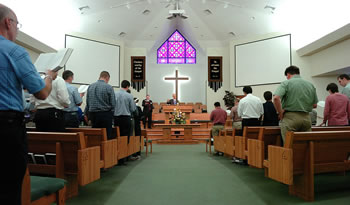 Q: Do you think it’s problem that so many young fundamentalists are attending conferences and events that are more in the evangelical mainstream as opposed to fundamentalist?
Q: Do you think it’s problem that so many young fundamentalists are attending conferences and events that are more in the evangelical mainstream as opposed to fundamentalist?
A: That depends on how these conferences are attended. To be frank, a kind of Christian celebrity mentality has developed that concerns me. Certain evangelical pastors who are very fine expositors and theologians are virtually venerated by many young evangelicals and fundamentalists to the degree that whatever these pastors teach is accepted with little or no biblical examination. I have attended and do attend mainstream evangelical conferences, and I have seen young men reduced to little more than groupies at the feet of a rock star. I do not view these pastors as enemies. They are godly men who love the Lord and who exposit His Word with great skill and passion. I attend evangelical conferences because I respect these men and can learn much from them. What I am afraid of is the carte blanche acceptance of all that they teach. Our fundamental Baptist history is peppered with men who were followed with that same type of theological naivete, and it weakened the Lord’s work in our churches. The worship of men, no matter how godly they may be, will always hinder the Lord’s work.
I should also add that having attended some of the better evangelical conferences and some of the better fundamentalist conferences, I have not found the evangelical conferences to be superior. The fundamental conferences I attend feature godly men who expound the Word extremely well and who encourage me in the Lord’s work. I have noticed that some who decry the weaknesses in Fundamentalism (and there certainly are some weakesses) attend only evangelical conferences and neglect the better fundamental conferences. When they do so, it is to their detriment. They are missing out on great blessings.
Q: Would you mind naming a couple of the fundamentalist events that have been especially helpful to you?
A: The Mid-America Conference on Preaching sponsored by Inter-City Baptist Church and Detroit Baptist Theological Seminary is always excellent. Inter-City’s Student Global Impact (now Missions Mandate) conferences are also tremendous. I have not been able to break away for Central Seminary’s Foundation’s Conference, but that is in the plan for the future. The CCGG is not of the magnitude of these others, but I think it meets a need in our local context.
Q: What have you personally found most satisfying about holding this event over the years? And what have been some of the biggest challenges?
A: What is most satisfying for me is fellowshipping with other men who care about truth and the Lord’s work and discussing the things we have learned throughout the day of the conference. The spirit of the conference is always very exciting and joyful. It’s just a very enjoyable and encouraging day. The biggest challenge has probably been the determination of each year’s theme(s). Every pastor is busy. None has time to just blow a day, so I try to package each conference in such a way as to really meet needs, inform, and encourage. I am really looking forward to next year’s conference—the theme being Evangelism and the Sovereignty of God.
 Aaron Blumer, SI’s site publisher, is a native of lower Michigan and a graduate of Bob Jones University (Greenville, SC) and Central Baptist Theological Seminary (Plymouth, MN). He, his wife, and their two children live in a small town in western Wisconsin, where he pastored Grace Baptist Church (Boyceville, WI) 2000-2013. |
- 71 views


Discussion